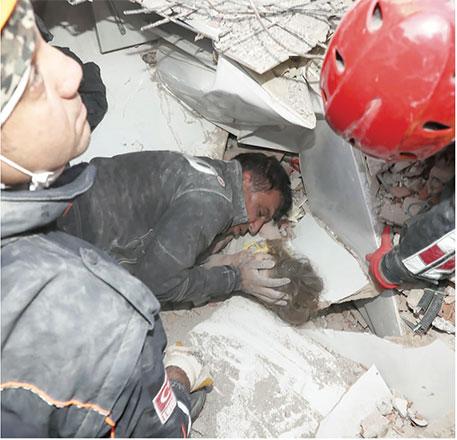- International News
- Web-2020-11-04 | 02:52 pm

Nayrouz News Agency :
A three-year-old girl was pulled from rubble on Tuesday, 91 hours after a powerful earthquake hit western Turkey, offering a ray of hope for grieving families as the death toll soared past 100.
But only hours after Ayda Gezgin was miraculously recovered in the hard-hit town of Bayrakli, rescuers found the lifeless body of her mother Fidan, 38, in the same room of their destroyed apartment.
Turks have been riding waves of emotion, from profound grief to elated relief, depending on whether bodies or survivors are extracted from the broken slabs of highrise buildings levelled by Friday's 7.0-magnitude quake.
Felt as far away as Athens, the quake killed two teenagers on their way home from school on the Greek island of Samos, where some homes collapsed.
But most of the damage struck in and around Turkey's Aegean resort city of Izmir, where the death toll reached 109 on Tuesday.
None of the Turkish coastal towns were hit harder than Bayrakli, a suburb of Izmir dotted with seven- and eight-floor apartment buildings, dozens of which were either damaged or completely destroyed.
'Smiling eyes'
The joy and grief felt by the Gezgin family within a matter of hours encapsulates the emotions tearing apart Izmir and the entire country as Turkey recovers from its biggest disaster in years.
Rescuers, exhausted but determined on their fourth day of round-the-clock work, broke out into applause and shouts of "Allahu Akbar" — or "God is Greatest" — the moment they realised they had rescued Ayda.
"We have witnessed a miracle in the 91st hour," Izmir Mayor Tunc Soyer tweeted.
"The miracle's name is Ayda," President Recep Tayyip Erdogan tweeted moments later.
"With your smiling eyes, you have inspired new hope for us. Thank God. Get well soon, my lovely little one."
The rescue came a day after a four-year-old and a 14-year-old were found alive in the same district, providing encouragement to rescue workers, despite persistent fears of aftershocks.
'So happy'
Ayda called for her mother as she was taken to a waiting ambulance in a gold foil blanket, an AFP correspondent at the scene said.
The Milliyet daily said her mother had returned home from taking the girl out to the neighbourhood park just 10 minutes before disaster struck. Her father was not at home at the time and survived.
"Slowly, slowly," the rescue workers told each other as they pulled the mother's body from the wreckage.
Hours earlier, many of the same people were hugging each other and crying tears of joy, realising they had saved a little girl who looked remarkably unharmed and completely calm.
Rescue worker Ibrahim Topal said the girl was discovered in the kitchen, in a small space created by the oven and other white goods.
"From the moment we heard her sound, it didn't matter how tired we were. It gave us energy again," he told AFP. "We were so happy."
Political anger
Turkey straddles a fault line that has generated some of the world's strongest earthquakes.
An even bigger, 7.4-magnitude quake in Izmit, about 100 kilometres southeast of Istanbul, killed 17,000 people in 1999.
Since then, Turks have been paying a tax to fund measures aimed at strengthening buildings and taking other steps to minimise the damage of a major quake.
Kemal Kilicdaroglu, the leader of the main opposition CHP Party, accused Erdogan's government of squandering tens of billions of dollars raised by the tax.
"Where has all that money gone," Kilicdaroglu demanded in a speech in parliament.
"But when it comes to Syrians, there is a lot of money," he added, referring to 4 million migrants — most of them Syrian — Turkey has been hosting after the civil war broke out in the neighbouring country in 2011.
Kilicdaroglu's comments drew immediate charges of racism on social media.
Erdogan's environment and urbanisation minister also noted that Bayrakli, which is a CHP stronghold, never submitted a list of "high-risk" buildings in need of added protection to the government.













